 Text: Jan Braula, Translation: Marlene Rosenthal, Illustration: Andreas Rosenthal
Text: Jan Braula, Translation: Marlene Rosenthal, Illustration: Andreas Rosenthal
Donald Trump, of all people. No American politician can boast as many long-standing rap connections as the prospective Republican presidential candidate. There are many parallels between the most successful US rappers and Trump. That’s why, for the last 20 years, this master self-promoter has been a friend to some rap protagonists, and a business mogul role model for many others. Vice versa, Trump has frequently expressed his sympathies for various famous rappers during his thirty-year spanning media career. In the course of his election campaign though, most of his former companions have abandoned him or remained silent. The fact is, however, that the 70-year-old had already exhibited his ultra-capitalist, materialistic, imperious and sexist tendencies long before his candidacy and precisely this attitude has in the past helped to further Trumps popularization. At first he became an American icon and rapper’s darling through his wealth, later on he did so through his populism. His name was mentioned at least 266 times in the most diverse rap lyrics – in most cases to glorify his person.
The range of rappers who have mentioned him in their lyrics stretches from Baby Boomers to Millennials, from East to West coast, from New England to the Dirty South, from underground veterans to rap millionaires. The very first Trump props on record were ironically in 1989, the year of the fall of the Berlin wall with Ice-T and Donald D:
„Yo Ice, I did a concert in the White House. And after that me and Donald Trump hung out.“ (Donald D, 1989)
Since then no year has passed in which Trump didn’t appear as a synonym for economic success at least a few times on various rap records. The goal wasn’t necessarily to increase Trump’s popularity, but that’s exactly what happened as a by-product. Mac Miller can tell you a thing or two about this phenomenon. The Pittsburg rapper’s biggest hit: „Donald Trump„. The world is taken over, while the haters stay mad: the typical Donald Trump shit. Over the years Mac Miller has become weary of explaining to people that by using the name “Donald Trump” for his song he was not talking about the actual person. Trump himself saw this differently. After a few millions of YouTube clicks, a visibly flattered Trump congratulated Miller via video message, calling him the new Eminem. But when the Pittsburg native sold more than a million Trump records, the multimillionaire demanded money in return for the use of his name. The rapper refused, whereupon the song’s namesake summed up his diplomatic skills in a Twitter post: „Kiss my ass„. In 2016 Mac Miller was given the opportunity to vent his anger on a late-night TV show, calling Trump „a racist son of a bitch„. At the same time, he cannot change the fact that his most famous song is commonly interpreted as a Trump-glorification. Miller is probably the worst case, but there certainly are many other rappers who gladly would like to take back their Donald flatteries, if only they could. So it’s almost surprising that during his election campaign he has not yet brought the following argument: You say I’m a racist, but then how come so many rappers like me?
But how did exactly did the New York native become such an icon to rappers? The story begins almost three decades ago with a book – „The Art of the Deal„. In his autobiographical guide to becoming a successful business manager, the then 38-year-old was throwing around phrases like „Think big“ and „Fight back„. The book’s title alone could have been the title of a rap song. These were the Reagan years, Donald’s big idol, a president preaching “law and order”. The Berlin Wall was still intact and the New York business magnate had just celebrated his biggest success on the real estate market to date: In 1983 the 860-feet-high Trump Tower was erected in the middle of Manhattan, a year later the 900-room Trump Plaza was completed. „The Art of the Deal“ became a bestseller and Trump’s person became famous far beyond the borders of New York City. He constructed his image as a popular, straightforward, and unapologetically provocative self-made millionaire with an „I don’t give a fuck“ attitude. As someone who’s made it big, showing it to the haters and conspirators “up there”. The ultimate player, hustler and pimp. The guy with a lot of bling-bling and the simple solution for complicated problems. Someone who has always divided life into good and bad, loser or winner, smart or stupid, us or them. Who is not for us is against us.
A quote from his business-advice book is particularly telling: „One thing I have learned about the press is that they are always hungry for a good story, and the more sensational the better„. This belief in intentional provocation shaped the next thirty years of Trump’s life as a media puppet – only in this case the puppet dictated the rules. As far back as the 1980’s business and society magazines graciously held out their hand: from countless home stories to Trump’s many marriages to his organizing of numerous beauty pageants and the running of his own professional football league. He fed the media with countless stories and massaged his own ego through the attention. His native real estate business took a backseat as he increasingly became purely a media figure. Whether the provocateur has always pursued this as his main goal is not clear, but: Without American pop culture, Trump would not have been able to achieve the necessary publicity to join the presidential primaries, let alone win them. Last year, Trump repeatedly referenced his alleged biggest work: America needs the kind of president who wrote a book like „The Art of the Deal“. The supposed co-author of the book claims that not a single word was written by Trump. But he wasn’t the only one using ghost writers: Among rappers it was already a common practice to let a fellow lyricist find the right rhymes for their image. A whole niche business was developed.
„Don’t worry if I write rhymes, I write cheques.“ (P Diddy, 2001)
No matter how absurd, contradictory, and fraudulently-half-true to plain false Trump’s statements are, the essential point remains to present them as provocatively, simplistically and confidently. This way these statements appeal to a large audience and put others in a state of uproar. Even before his political career, the presidential candidate had already exhibited numerous verbal outbursts with the sole aim of increasing his popularity. Years before becoming a presidential nominee, he contested the US-citizenship of Barack Obama and challenged him to reveal his birth certificate several times. Against the TV personality Rosie O’Donnell, he led a fierce verbally abusive fight with countless cheap shots. According to Trump he would only have to send one of his male friends to make her longtime girlfriend reconsider the relationship. In spite of his continuous provocations, people’s interest was roused when he was openly flirting with the highest office in the country, shortly after the release of „The Art of the Deal“. Little did they know that his megalomania was to become reality.
Along the way Trump was courted by American pop culture: almost twenty times he was allowed to stage himself as a popular guest star in well-known film and television productions. The films and TV shows he has appeared in range from „Home Alone“ (1992), „The Nanny“ (1996) to „Sex and the City“ (1999). Another sitcom with a close connection to hip hop culture that granted Trump his two minutes of TV-fame: „The Fresh Prince of Bel Air„. In an episode broadcasted in 1994, Donald and his second wife suddenly appear at the “Prince’s” doorstep and are introduced by the butler as „Mr. and Mrs. Donald Trump“. The otherwise laid-back rapper and actor Will Smith is completely beside himself panting while shaking the multimillionaire’s hand. In Europe during the nineties, this scene is almost incomprehensive to the author, while across the pond it doesn’t need any further explanation – Trump is unanimously understood as the figurehead of wealth and power.
The screen adaption of „The Art of the Deal“ starring Johnny Depp is a little less flattering. Released this year, the TV movie makes mention of his connections to rap culture: In the movie Trump orders the rap crew Fat Boys to his office to perform their „Law Suit Rap” song. Same as with his actual movie appearances, the boundaries between fiction and reality are blurred. The rap crew Fat Boys did actually exist back when “The Art of the Deal” was released. Their biggest hit was the similarly titled „Jail House Rap”. Like Run DMC, Kurtis Blow, the Beastie Boys and Public Enemy they were signed to Def Jam Records. Hip hop mogul Russel Simmons who later became a friend of Trump’s was head of the record label at the time. During the eighties he was responsible for rap’s commercial success as a music genre: the label’s history was turned into a kitschy “Krush Grove” Hollywood movie by Warner Brothers. Songs like “Walk this way“ and „Fight for your right“ were the first big rap hits on MTV, the Fat Boys were doing commercials for Swatch watches, while Run DMC dedicated a song to the brand Adidas. Paid product placement was thus institutionalized in rap at the same time as Donald Trump become a successful pop culture figure.
Like Trump, who is nine years older than him, Simmons grew up in Queens. But while Trump’s father was a millionaire, Simmons dealt with drug problems and gang violence. Nevertheless, both saw themselves as underdogs, who had to fight to get to the top. During the big Studio 54 era in the eighties Trump and the Def Jam boss met in person for the first time. Over champagne and caviar they quickly became good friends – Simmons would often travel in Trump’s private jet and was a frequent guest at Trump’s Florida domicile with his family. In the 2001 biography of the rap mogul Simmons is quoted saying: „Trump has been very influential in helping me expand my vision. Sometimes I talk to Donald two or three times a day, and he’s taught me many things. „
Over the years, Simmons has helped to facilitate numerous connections between Trump and rappers. One of these connections was Method Man of the Wu-Tang Clan. Trump is featured on his second solo album. Although he isn’t rapping, he can be heard on Method’s answering machine. Ten years earlier Method Man’s colleague Redman rapped: „I’m well known like Donald Trump„. Raekwon, another member of the Wu-Tang clan, asked, „Guess who’s the black Trump?“. With Smif-N-Wessun Raekwon, who later converted to Islam, produced a whole „Black Trump“-song. Fifteen years later, he then praised another rap millionaire as „the Donald Trump of Rap“: P Diddy. In addition, the Bad Boy reminded him of Russell Simmons. And of course it was Simmons who later introduced the two former business students. Trump subsequently was a frequent guest at P Diddy’s luxury parties in the Hamptons, later calling him a “great guy” in 1999. At one of these parties a journalist was able to get this quote from Trump:
„I think hip hop has done more for race relations, and more respect among everyone, than anything. Because these guys really are respected. I can tell you – the most important white people have total respect for these guys.“(Donald Trump 1999)
Nowadays he goes out of his way to contribute to the division of America by race and ancestry, with the aim of increasing his own popularity. From his inaugural speech in 2015 to his speech on immigration in August 2016, Trump knows how to appeal to American’s lowest instincts when it comes to immigration: according to him, Mexicans would bring drugs and crime to America, most of them are rapists. One must be crazy to help the Syrians. The main problems of America? Political correctness and illegal immigration. Cautious estimates suggest that there are over ten million people illegally living in America. Nearly half of them are Mexican. Trumps solution? All are guilty and need to go, we will just build a wall. Muslims shouldn’t even be allowed entry to the country. His longtime friend Russell Simmons already ended their friendship after this inaugural speech. After all, Simmons himself had used his great popularity in recent years to help facilitate the dialogue between the members of different ethnic groups and religions. A year ago, Simmons mocked his long-time friend by saying Kim Kardashian would make a better president than Trump. Months later, his mocking turned into worry. He later wrote an open letter in which he appealed to Trump’s reason: „Stop the bullshit, stop fueling fires of hate. Don’t feed into the rhetoric created by small-minded people.“
P Diddy however still respects Trump. For him the presidential candidate is a hard-working guy and a good friend. According to Diddy, Hillary Clinton didn’t deserve the “black vote” during the first primary. Another hip-hop mogul from New York who thinks highly of Trump: 50 Cent – he’s described him as „amazing“ a year ago and has shrugged off Trump’s comments on Mexico as a marketing gag. In addition, he compared Trump’s candidacy to Kanye West running for president in 2020. Years ago Trump already complimented 50 „Get rich or die tryin’“ Cent – he called him „a sort of friend of mine“ and a „nice guy“. The other way around, Trump was seemingly a hero to 50 and Diddy, like he had been for Russell Simmons in the past. But he wouldn’t just remain their hero, he actually became their role model.
One example made this particularly clear: In 2004 The Donald gained his biggest stage in American pop culture to date – his own reality show. Over the next ten years his show had over 30 million viewers. On „The Apprentice“ candidates had to work in one of Trump’s many companies, competing for managing positions. In the course of the show Trump fired candidates every week, his characteristic „You’re fired“ became a well-known catchphrase. The candidates were divided in teams by sex, Trump’s initial idea to do the same with the candidate’s skin color was rejected by producers. Regardless, the show was met with admiration by at least two rappers. Both P Diddy and 50 Cent tried to shamelessly copy the concept of “The Apprentice” with their own shows named „I want to work for Diddy” (2008-2010)“ and „The Money and the Power (2008-2009)„, both failing to replicate Trump’s success.
Their shows weren’t supposed to be about rap music, but instead about business and money. Both presented themselves as business moguls and uncompromising hardliners. Their rap background took a backseat. Assholery was similarly glorified as on the „The Apprentice“ by all involved. 50 Cent can be seen in a suit, wearing a massive sparkling watch, telling the camera that every day people ask him how to make it to the top, but to 50 good advice isn’t cheap. Similarly P Diddy describes himself as a superhuman, one of his assistants boast into the camera that she’s only taken ten vacation days in the last 5 years of working for Diddy. Both rappers throw around statements like „Go hard or go home„, „Life is a war, we just try to win it“ or „It’s all about business„. Catchphrases that either could be taken from Trump’s „The Art of the Deal“ or be actual rap lyrics. Trump incidentally used “Go big or go home” in a Pizza Hut commercial he did in 1995.
The fact that both P Diddy and 50 Cent got their own shows at all, had to do with their other – more successful – ventures. Like Russell Simmons and Jay Z, both had their first business experiences as label managers. Over time however, all of them realized that only selling records would not get them the wealth they desired. Similar to Trump’s real estate business, most of the successful rappers did not stick to their main source of income making hit records. In the beginning, they used their popularity doing commercials for everything money can buy from Garnier Fructis Flow, Hewlett Packard to the „Obey your thirst“ hip hop campaign by Sprite. While Sprite is currently still running its „Obey your verse“ campaign and Nas has been hired as a Hennessy Brand Ambassador, for years rappers have mainly concentrated on promoting their own brands and collaborations. Lots of their money was put into fashion labels, headphones, streaming services, soft drinks, „Magic Stick“ condoms or their own baseball and basketball clubs. This would proof profitable for many rappers turned business men. Trump has been going down a very similar road in the past three decades. The presidential candidate has successfully used his personal brand to promote various products and services. This ranges from his personal „Trump“ airline to a fashion label, perfumes and vodka. Similarly to Trump both P Diddy and 50 Cent founded their own vodka labels Ciroc and Effen Wodka and have their own perfume lines called „I am King„, „Unforgivable night„, and „Power“ while Trumps fragrances have names like „Success“ and „Empire„. Compared to that Jay Z’s perfume line „Gold“ seems almost modest.
Most successful rappers have a similar view to Trump of what constitutes the American dream: skyscrapers, cigars, private jets, expensive whisky, willing women – in short: Pimpin, Fame and Hustle. It’s not that anti-consumerism doesn’t appear in American rap, but that’s not the type of rap that’s been featured in Trump’s favorite magazine as early as 2007. Forbes, the mouthpiece of the richest 1%, made a win-win deal introducing the „HipHop Cash Kings“ into their magazine. In 2016, P Diddy was ranked in first place having a net-worth of a whopping 62 million US dollars. Other rap entrepreneurs like Drake and Dr. Dre, who two years previously had a net-worth of around 620 million dollars, are not quite yet in Trump’s tax bracket economically, but are undeniably part of the growing economical inequality in American society. In the German-speaking rap landscape no one’s been able to replicate this kind of financial success, but it’s not for lack of trying: everyone of name has worked with Red Bull and German rapper Sido even founded his personal „Ka-Bumm“ vodka brand. Austrian rapper Nazar tried his hand at being a business man and political advisor which at least landed him on the cover of Austrian Forbes magazine. But compared with their American counterparts German-speaking rappers have not been able to influence society, economy and politics like their American counterparts – but that’s probably for the best.
„Forbes list, Forbes list, Forbes list, Forbes, read it like the Bible.“(Rae Sremmurd, 2015)
In the US, product placement has reached a quantity never seen before: P Diddy had no qualms about including a shout-out to his own vodka brand in his verse for the „Don’t shoot“ campaign song that was released following the tragic shooting of Michael Brown. „Police taking shots and I ain’t talkin ‚bout Ciroc.“ This was not the first time P Diddy’s insensitivity created political controversy. In 2004 the former business student launched his „Vote or die“ campaign. It was directed mainly at African-American youths and was supposed to prevent Bush’s re-election as president. Nevertheless, Diddy had no problem being invited to the White House by Bush. He also met with Barack Obama, the then Senator, for an MTV-Interview. In it, he called Obama who’s actually eight years older than Diddy, „my son“, which Obama took with an embarrassed smile. Diddy even generously offered his media savvy to Obama, should he ever need a media platform. Ultimately Republican Bush won the elections and P Diddy’s political involvement subsided. Similar to Trumps flip-flopping political convictions, these days the Bad Boy has turned on the democratic process altogether, recently saying that all democratic elections are fraudulent and corrupt.
P Diddy, of course, was not the first and last rapper with political influence: Beginning with gangster rapper Eazy E, who donated money to conservative Republicans and was subsequently invited to a political dinner, many influential rappers like Jay Z, Ludacris and Common have been given a voice by American politics. Especially president Obama has raised the bar: more rappers than ever before played a vocal role in his eight-year presidency. Their involvement was no longer only reduced to a symbolic handshake: After Kendrick Lamar’s visit to the White House in January of this year, a video was published by the musician appealing to the non-violent and creative potential of young people. This „My Brother’s Keeper“ initiative is primarily aimed at African-American children and youth with little educational opportunities. On Independence Day Kendrick Lamar even played a concert for his most influential fan. In April of this year, this time not as publicly, Obama invited a whole group of rappers like Talib Kweli, Chance the Rapper, Nicki Minaj and Busta Rhymes to the White house. Even Rick Ross was invited, who in the past had compared himself several times to Donald Trump in his lyrics.
As with Trump, it’s not always clear what’s behind the motivation to associate themselves with particular politicians: use their popularity to get involved in politics and effect political change? Or to use politicians for their own popularity? This question brings us to people like Kanye West who’s supposedly planning to run for president in 2020. He made this announcement saying: „I just want people to like me more.“ If this statement was inspired by Trump is unclear, but Trump appeared to be pleased by West’s announcement. It would be a pleasure to compete with his entertainment industry colleague in four years. Barack Obama’s reaction to Kanye West’s plans was no less amused: „It could not get any stranger.“ But the fact that both Trump and Obama reacted to West’s announcement proves that his influence on the American public sphere cannot be denied.
Trump is not all about rap musicians: he was in good contact with Michael Jackson, Madonna and Prince. The latter even dedicated a love song to him 25 years ago: „Donald Trump Black Version„. Popstar Trump, too, likes Pop music: His speeches on the campaign trail were always accompanied by various pop songs, whose artists were overwhelmingly not asked for their permission. Of course, Trump also used a rap song: „Jump around“ by House of Pain, whereupon their front man Everlast called Trump „biggest load of shit ever„. What makes this particularly juicy: Everlast is one of the numerous American rappers who have converted to Islam in the course of their career. Wu-Tangs Raekwon is another example of a converted Muslim who changed his mind on Trump after his remarks on Muslims. As a result of Trump’s racist speeches props from rappers have been spars and more restrained in the past year. The artists who have openly endorsed Trump are people like Azealia Banks, White Dawg, Kid Rock and Aaron Carter.
„Can I rap to you, sugar, tonight? Donald Trump maybe that’s what you need.“ (Prince, 1990)
The number of those who want to send Trump packing for his xenophobic statements is far greater. Will Smith wants deport Trump, Wyclef Jean has ended their friendship. Others have joined in: the rivaling L.A. gangs of the Bloods and Crips have come together to declare „Fuck Donald Trump„. In turn, democratic nominees Bernie Sanders and Hillary Clinton have enjoy large support. Numerous rap personalities have vocally supported Trumps opponents or have met publicly with them. Timbaland even supported Hilary Clinton financially. The defeated Bernie Sanders had one of his election speeches prefaced by a speech from Killer Mike’s and was supported by Lil B. Nevertheless Donald Trump remains the candidate with the biggest connection to rap music. This was also recognized by the makers of the Daily Show who shot a music video about him. In the video Ray Wood Junior, an African-American actor and comedian, was turned into „Black Trump“. In it numerous radical, contradictory and racist quotes from the presidential candidate are put into a close connection. All of this is peppered with tightly clad women, dollar bills being thrown and other typical rap gestures. Unfortunately, at this point it’s hard to tell reality from satire in this.
Should Donald Trump really win the election in one month, this could have unimaginable consequences for the world of rap. During his presidency it would probably be the business moguls who are invited to the White House rather than socio-critical rappers like Kendrick Lamar. Russell Simmons already said he was coming – to guide Trump back in the right direction. In addition, the propagandization and radicalization of the Survival of the Fittest and the increasing segregation of society according to ethnic and economic boundaries could lead to a great gangsta rap revival. In any case, Trumps‘ presidency would intensify the politicization of American rap. But who knows, maybe Trump still has some big names ready to endorse him up his sleeve – at leat this he hasn’t accomplished yet.
Ähnliche Posts
- Make Reading Sexy Again // Saul Williams Interview
To say the year 2016 was turbulent would be an understatement. And most of its consequences remain…
- The Story of a Long Lost Relative // DJ Werd Interview
DJ Werd ist seit Jahren eine Art "graue Eminenz" im deutschen HipHop-Geschehen. Aufgewachsen in San Jose,…
- "Srebrenica is the fault of the UN" // Edo Maajka Interview
There is something going on in South-Eastern Europe and who can tell us better about…

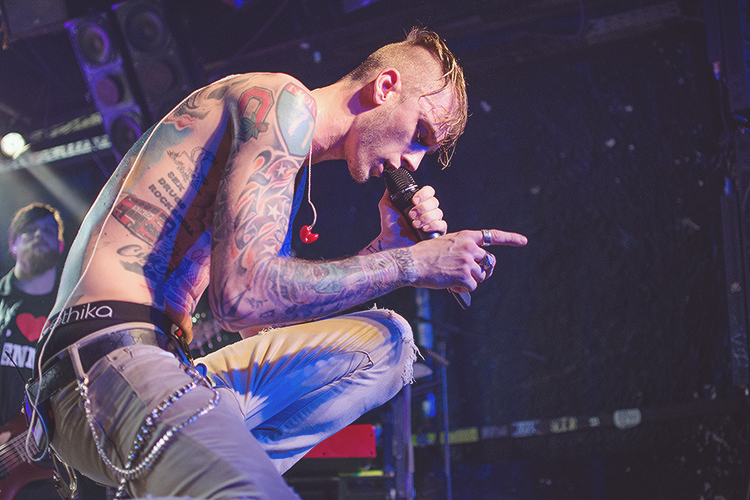

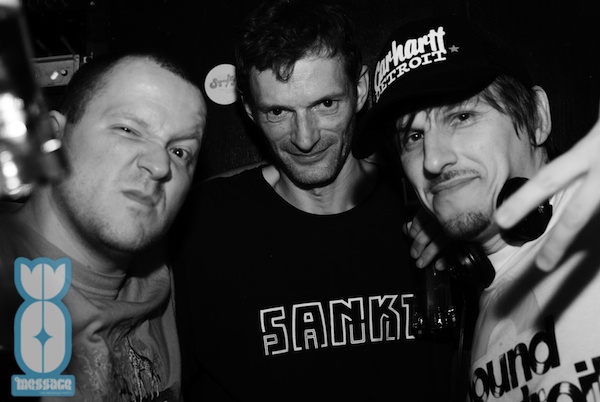

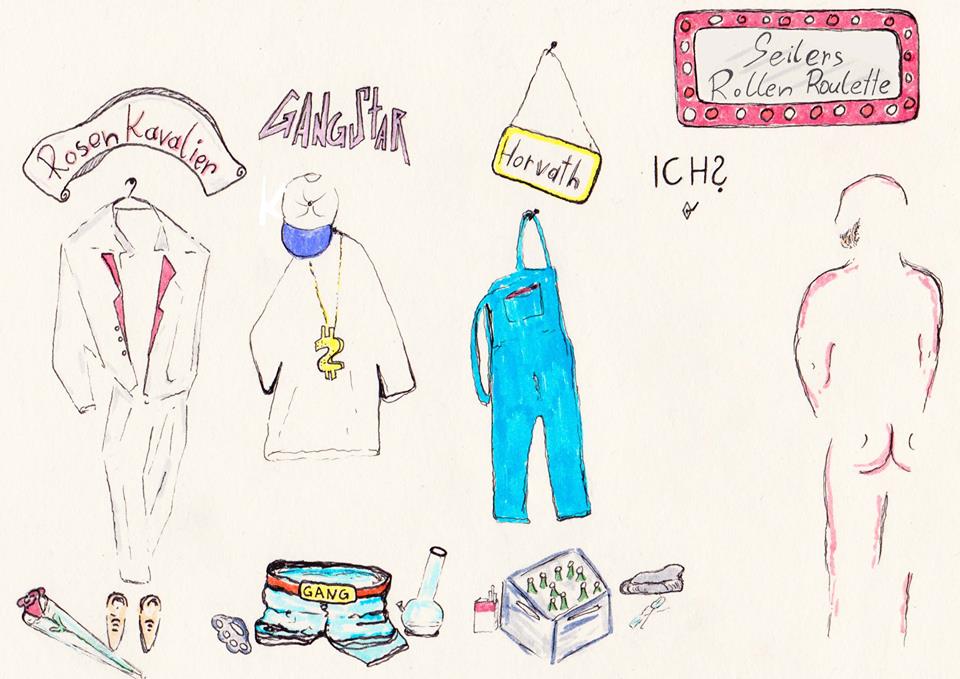
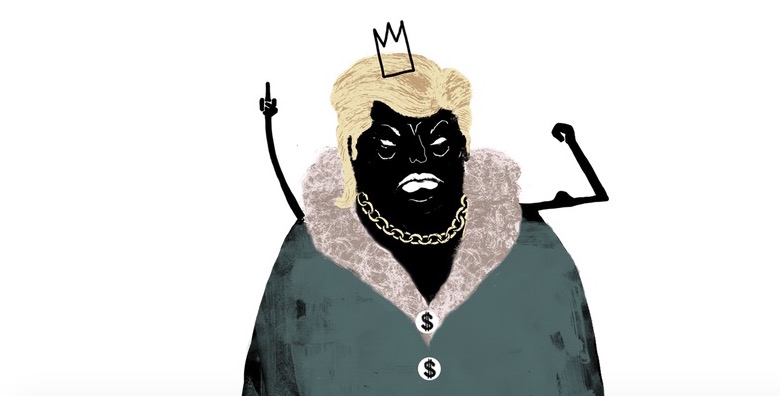
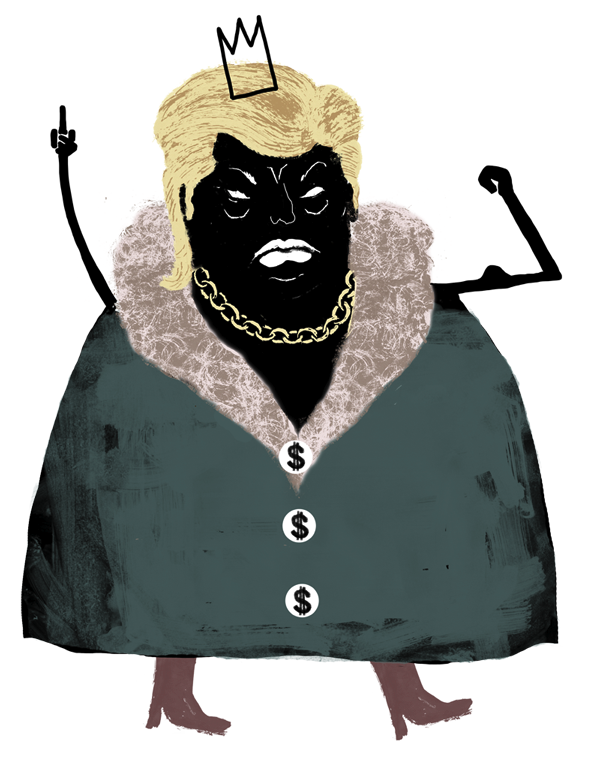 Text: Jan Braula, Translation: Marlene Rosenthal, Illustration: Andreas Rosenthal
Text: Jan Braula, Translation: Marlene Rosenthal, Illustration: Andreas Rosenthal